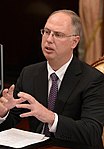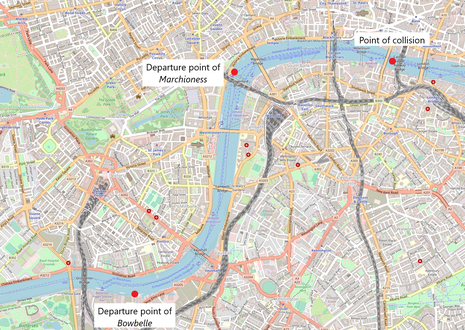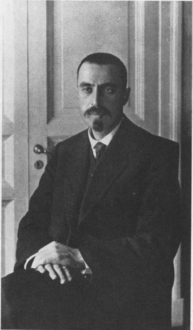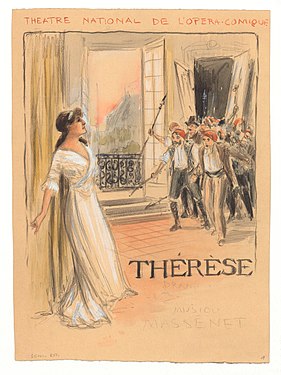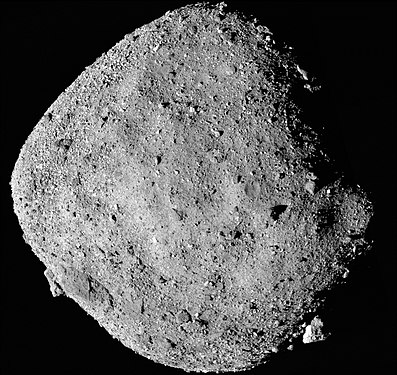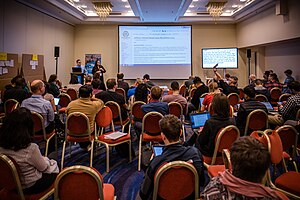Wikipedia:Wikipedia Signpost/Single/2019-04-30
An action-packed April
RfXs
- Primefac filed an RfB on 31 March 2019, a mere 2 weeks after DeltaQuad was promoted as a result of her RfB. Primefac's RfB was closed as successful with a final tally of 151/7/5. This makes 2019 the first year since 2014 with 2 new bureaucrats, and there are still 8 more months to go!
- Bishzilla filed a (serious) RfA for RexxS on 1 April 2019. After a 'crat chat, Dweller closed the RfA as successful. The story continued, however; Pudeo then proceeded to file a request for Arbitration, arguing that the RfA should have been closed as "no consensus to promote" instead. More coverage in the Arbitration report.
- On 12 April 2019, 'crat Wizardman retired from the project. An active editor, he even participated in Rexx's crat-chat.
- Just a few weeks after the last RfA, Ritchie333 and TonyBallioni nominated HickoryOughtShirt?4 for adminship. As of writing, the RfA is still open for discussion.
– D
April Fools' recap
Additional contributors: Pythoncoder
- As part of Wikipedia's April Fools' Day festivities, a recently created Wikipedia newspaper called TheWikiWizard was nominated for deletion at MfD. Signpost writer DannyS712 also writes for it.
- This year there were 2 successful RfAs: Linguist111 (testing) (closed at <10/9/1>), and DeprecatedFixerBot (closed at <7/13/6>). There was not a single unsuccessful RfA filed on April Fools' Day. RfBs, however, didn't fare as well: while ZLEA2 was closed as successful (with a final tally of <?/?/?>), ClueBot NG was unsuccessful, with their RfB closing at <17/16/12>.
- On the other hand, no humor BRFAs were denied: DeletionBoot was approved for trial, while C-3PO is still pending.
Other publications
The Signpost is not the only active publication here on the English Wikipedia. Other regular distributions include the
– D
Brief notes
- A new global special page, meta:Special:UrlShortener, was introduced.
- ArbCom accepted its first case since February.
- Three administrators were desysopped due to inactivity in April.
– D
Is Wikipedia just another social media site?
Most Wikipedians are proud of their creation – a huge, up-to-date, good quality encyclopedia that may last for the ages. Our encyclopedia is certainly not a social media site. But let's see what the rest of the media say.
A kind of social network?
"Wikipedia Isn't Officially a Social Network. But the Harassment Can Get Ugly" writes Julia Jacobs in the New York Times.
[Wikipedia] is a kind of social network where users debate the minutiae of history and modern life, climb the editorial hierarchy and even meet friends and romantic partners. ...
It is also a place where editors can experience relentless harassment.
The focus of the article is on harassment of transgender and women editors.
Jacobs reports that trans male editor Pax Ahimsa Gethen suffered personal attacks for several months in 2016. Gethen's anonymous harasser called them "insufferable" and "unloved" adding that they belonged in an internment camp and should kill themself. Other examples are given about LGBT and women editors on French and Persian Wikipedia.
Harassment reports on Wikipedia are handled mostly by unpaid volunteers on Wikipedia, unlike similar reports on Facebook and Twitter. On English Wikipedia, complaints are often handled publicly, which can result in undesirable confrontations.
Katie Bouman and the power of social networks
Katie Bouman became famous soon after a photo of her was tweeted as she watched the very first image of a black hole being processed, an image she helped create. The Wikipedia article on Bouman was created a few hours later by Wikipedian Jess Wade.
- Writing in a Washington Post op-ed "It matters who we champion in science", Wade and her co-author Maryam Zaringhalam explained the origin and importance of Bouman's fame as part of a social network that will help inspire future women scientists.
This week, millions of girls and women around the world who have been told science is not for them found a new role model in Bouman — a new data point that told them yes you can.
- In Slate's "How Katie Bouman Shook Wikipedia" Stephen Harrison writes about those who tried to delete the article, and how the article survived the attempted deletion.
- In The Atlantic, "The Dark Saga of Katie Bouman" follows the ups and downs of the internet battle over Bouman's depiction and compares the Wikipedia article on Bouman to that of Nobel laureate Donna Strickland.
The internet in the Mueller Report
The redacted
According to the report (see Vol. I, pages 147–158, especially pp. 151–155), after the 2016 U.S. presidential election Russian President Vladimir Putin tried to establish unofficial "back-channel" communications with Trump. A connection was attempted through the following series of links:
Dmitriev, who reports directly to Putin during his day job as an investment banker, asked Nader, a Mideast go-between, to contact somebody in the Trump entourage. Nader convinced Prince to meet with Dmitriev on January 3–4, 2017, in part by sending Prince the link to Dmitriev's Wikipedia article. Prince then talked with Bannon, showing him a screen-shot of Dmitriev's Wikipedia article. Bannon does not remember this meeting with Prince, and this back-channel communication seems to have ended there.
But, why did Nader send Prince a link to Wikipedia? And why did Prince show Bannon a screenshot of the Wikipedia article on Dmitriev? Why not just send a resume?
Other social media connections
- What do J. S. Bach and Mötley Crüe have in common?: Answer – spikes in Wikipedia page views and inclusion on Billboard's Social 50 chart which ranks entertainers based on their popularity on Facebook, Twitter, YouTube, Tumblr and Wikipedia.
- Used by YouTube: Bloomberg News reports how YouTube executives ignored warnings, letting toxic videos run rampant before sloughing off much of the responsibility for screening videos onto Wikipedians.
So perhaps we might conclude the Wikipedia is not so different from social media sites, sharing both the ability to change social perceptions and problems like harassment.
In the comments section below please let us know how you answer the question "Is Wikipedia just another social media site?"
In brief
- In Akan it says ... : Translating Wikipedia into Akan in Ghana
- In Irish it means ... : "The Irish-language version of Wikipedia is going strong" by Darach Ó Séaghdha, author of Motherfoclóir, an irreverent Irish dictionary. (What did you think it meant?)
- Systemic bias covering recent years: "The Four Eras of Wikipedia and Visualizing History Without Maps" in Forbes raises awareness of Wikipedia's bias against one of the most under-served classes of article subjects: people from past centuries. The article describes a tipping point after which Wikipedia's coverage of contemporary issues achieved a high level of quality, and thereafter editors began to fill in temporal and geographic gaps.
- Doxxing senators on Wikipedia: "Former Senate staffer admits to doxxing five senators on Wikipedia" in The Verge. Sophos' Naked Security describes how the Wikipedia vandal, who also broke into congressional offices and computers, will likely receive a jail sentence in a plea agreement.
- Beauty is in the eye of the beholder: "'A strong campaigner': the beauty of Wikipedia" an Australian politician explains "the beauty of Wikipedia" is how her staff can update her page with her intended messages for the public.
- Better democracy?: "Want to know how to build a better democracy? Ask Wikipedia" by Wikipedia beat reporter Noam Cohen in Wired analyzes Wikipedia's response to declared paid editors on Wikipedia.
- What does a Wikipedian in residence do all day?: Long-time WiR Mary Mark Ockerbloom who works with the Science History Institute explains.
Gobbler of the month

awarded to
Everipedia
April 2019
Everipedia, which claims to be the "world's largest online English encyclopedia" posted a press release on why they are better than Wikipedia. Everipedia's 6 million plus articles include about 5.5 million old Wikipedia articles. Searching for "main page" on Everipedia will take you to a page titled "Everipedia, the encyclopedia of everything" with the text starting "Welcome to Wikipedia, the free encyclopedia that anyone can edit. 5,532,166 articles in English" followed by the rest of Wikipedia's Main Page from December 16, 2017.
The press release immediately invites skepticism by stating that "a third of (Wikipedia's) content is created by just one man", apparently referring to Steven Pruitt. Pruitt has made over 3 million total edits on Wikipedia and edited more than 1 million of the nearly 6 million English-language articles, but has not contributed all of the content to those articles.
The core of the press release is based on a survey of 1,000 Americans. Neither the methodology or a full set of results are given. Decrypt reports that the survey is informal and "not an academic, peer-reviewed report or study", quoting an Everipedia spokeswoman.
Everipedia reports 13 survey results, including:
- A majority of Wikipedia "users" have never edited an article. They apparently mean that a majority of Wikipedia readers have never edited an article.
- 75 percent of respondents said they'd be more likely to contribute to Wikipedia if they were paid.
The only unexpected survey results, in the eyes of this reviewer, is that the results conform completely with information that is already widely available or at least suspected. In a survey with this many questions at least a few unexpected results are to be expected.
Everipedia's response to the reported problems involves paying their editors with their own cryptocurrency called "IQ", a type of electronic wooden nickel.
David Gerard, Wikipedia's own expert on all things about cryptocurrency, remarks that there are "real problems with Wikipedia" that the survey notes "and we're very aware of them. But that doesn't mean Everipedia's paid-editing model solves a single one of them, and they've given no evidence that it does."
The Signpost's request for further information about the survey has not been answered.
English Wikipedia community's conclusions on talk pages
Talk Pages Consultation 2019: A summary of the English Wikipedia and sister projects' ideas
With nobody else stepping up to close the English Wikipedia's discussion regarding the future of talk pages, it was up to Alsee to post the results. Here are some of the key takeaways:
- Almost nobody wants Flow or a similar talk page replacement to return.
- That doesn't mean people don't want change, though—in the same straw poll that asked about support for Flow, 95% of users supported some kind of "incremental" change to talk pages.
- There were many complaints regarding posting to talk pages using the mobile site, due to the widespread stance that the mobile site is more focused on readers than editors. As such, several users mentioned using the desktop site when editing on mobile devices.
- Several users cited difficulty regarding how to thread discussions, including where to reply and how to indent.
- Many users asserted that user engagement problems are more due to Wikipedian cultural problems, as opposed to issues with the way talk pages work.
- Almost everyone wants to keep wikitext and regular page histories/diffs.
- Infinite scrolling is very unpopular.
- Many users want autosigned comments.
- Some users want VisualEditor enabled in talk and other namespaces.
- Other issues discussed include low-visibility talk pages, making it possible to add individual sections of a page (for example, on WP:ANI) to watchlists, and edit conflicts.
- Alsee concluded by saying: "It's worth noting that a member of the Wikimedia Foundation Board of Trustees participated in the consultation, and they were part of the near-unanimous support for keeping and improving the existing wikipages for Talk."
Sister projects
Some sister projects, however, came to different conclusions. Here's a summary of all the sister projects' summaries:
- Catalan Wikipedia, which uses Flow, liked Flow for small discussions because it removed the requirements to ping users and sign posts. For longer discussions, there are problems with Flow's inability to manually move off-topic messages. Flow's infinite scrolling was also criticized.
- Chinese Wikipedia, which has Flow enabled on a minority of talk pages, complained about Flow's handling of their wiki's automatic Traditional Chinesescript conversion system. They also criticized Flow's incomplete wiki markup support, infinite scrolling and poor table-of-contents capabilities. Some users suggested enabling VisualEditor on most talk pages.
- The discussion on Dutch Wikipedia centered mainly around behavioral issues. Users cited newcomers' issues with talk page syntax, as well as incivility by more experienced users.
- English Wikisource users wanted it to be more clear to new users how to centralize discussions.
- French Wikipedia preferred wikitext talk pages, even though they saw them as complicated, especially for new users, for many of the reasons English Wikipedia contributors mentioned. Users also complained about the requirement of signing posts and it being difficult to notify other users. Flow was seen as more newcomer-friendly, but was more unpopular due to its infinite scrolling (you may be sensing a theme here) which makes it hard to search for section, excessive notifications, unreadable topic names, poor wikitext and history support, and disengagement from the community. That last one will hopefully be resolved with this consultation taking place.
- French Wiktionary discussed centralization, the complexity of wikitext, and making discussions on multilingual projects like Commons more open to other languages. They also dislike Flow.
- German Wikipedia apparently had a rather large discussion, but it has not yet been summarized. This is a pity since they are one of the largest Wikimedia projects. The Arabic and Hindi Wikipedias have also not posted their conclusions.
- Hungarian Wikipedia, which was going to switch to Flow before this was blocked by this consultation, supported creating something more social media-like to appeal to younger users. They also supported creating an autosign feature, and making indentation less confusing.
- Iberocoop are more frequent users of offsite services. Like many projects, they would like to see an autosign feature added and see indentation become less confusing. Additional requests to provide incremental talk page improvements include automatic archiving and tools to deal with bad-faith comments. Others supported Flow or something more forumlike.
- Japanese Wikipedia wants, you guessed it, autosign, as well as making talk pages more newcomer-friendly. Many participants were mobile users and they found it hard to use talk pages with their mobile devices.
- Polish Wikipedia wants a reply button, better tools to quote other users, section watching. They also expressed concerns about accessibility to newcomers as well as being able to opt out of any new changes.
- The closer at Russian Wikipedia took the WMF to task for taking inspiration from social media sites when that's not what talk pages are used for. Major issues listed with Flow include infinite scrolling and the amount of whitespace. Some users did not oppose a "tree view", but wanted a way to switch between that and a more traditional wikitext mode. Miscellaneous requests: edit conflicts being automatically resolved and, once again, autosign.
- Thai Wikipedia wanted autosign, auto-reply, and more civility (a behavioral issue).
- Some Wikidata users requested section watchlisting. Flow is a divisive issue on Wikidata; issues with Flow (coming from both Flow supporters and opponents) include its bugginess, no diff support, notification volume, and... if you've read through the rest of this, you know what I'm going to say here. Hint: it starts with "infinite" and ends with "scrolling".
Paid editing ban under discussion
Following the
In brief
- There has been some drama about administrators deleting pages under community sanctions. Wikipedians WP:AFD.
- In addition to the ongoing portal deletion discussions, users are discussing whether there should be stricter rules regarding portal creation. Several proposals have been made regarding whether portals should have WikiProject sponsorship or should go through a new Portals for Creation process.
- The controversy regarding a close of a recent RfA has led to discussion about whether RfA should be a straight vote or not. Consensus seems to be in favor of the status quo (not a vote, or maybe a bit of both).
Follow-ups
- The discussion on whether to create CSD X3 closed as no consensus.
- Consensus to make a Wikipedia:Current events noticeboard, but nobody seems to have created it yet. Am I missing something?
Anguish, accolades, animals, and art
Featured articles
Twenty-four
Featured lists
Ten
Featured pictures
Thirty-five
-
Anguish by August Friedrich Schenck
An Active Arbitration Committee
Arbitration Policy – Proposed amendment passes
The Arbitration Committee resolved by motion to amend the "Conduct of arbitrators" section of the Arbitration Policy. The entire motion is reprinted below.
The final paragraph of the "Conduct of arbitrators" section of the arbitration policy is amended as follows:
- Any arbitrator who repeatedly or grossly fails to meet the expectations outlined above may be suspended or removed by Committee resolution supported by two-thirds of all arbitrators excluding:
- The arbitrator facing suspension or removal, and;
- Any inactive arbitrator who does not respond within 30 days to attempts to solicit their feedback on the resolution through all known mediums of communication.
Pursuant to the policies for changing the arbitration policy (Wikipedia:Arbitration/Policy#Ratification and amendment), the community had to decide whether to amend the Arbitration policy or not. Specifically, the proposed amendment had to undergo a community referendum, and would only enter into force once it receive[d] majority support, with at least one hundred editors voting in favour of adopting it.
That referendum was held at Wikipedia:Arbitration/Policy/Proposed amendment (April 2019), and was closed in favor of the proposed amendment.
Cases and Controversies
Portals Issue
A case request was submitted by Robert McClenon on 23 March 2019. The request attracted statements from 28 users, amassing more than 100,000 bytes of content. In the end, however, the committee declined the case request on 4 April 2019, with 2 Arbitrators voting to accept the case while 6 preferred declining it. See the archived discussion here.
Bureaucratic Bureaucracy
As highlighted in this issue's news and notes, this month saw the successful RfA of RexxS following consensus at a bureaucrat chat. However, Pudeo asked the Arbitration Committee to review the 'crat chat, arguing that The bureaucrats' actions are not within the mandate they have been given
and requesting that the Committee consider 1) affirming the 2015 election reform RfC, 2) review whether Maxim and possibly other bureaucrats acted within policy, and 3) overturning the bureaucrat chat.
The Committee voted 10-0 to decline the case. The full case request can be found here.
Enigmaman
After a hiatus that lasted over 2 months, the Arbitration Committee opened its second case of the year on 13 April 2019. As of writing, the scope of the case is limited to examining The administrative conduct of Enigmaman [and] What action is required, if any.
See the prior (archived) discussion at ANI here, and the full case itself here.
Arbitration Procedure Amendments
Compromised admin accounts
Last month, Necrothesp's administrative permissions were removed under level 1 procedures "as a suspected compromised account". This month, the committee resolved to return their bit. Furthermore, the Arbitration Committee has taken steps to encourage administrators to improve the security of their accounts.
The Arbitration Committee resolved by motion to amend the "Return of [administrator] permissions" section of the Arbitration Procedure. The entire motion is reprinted below.
Since November 2018, six accounts have been desysopped under the
The Arbitration Committee resolves that the return of administrator privileges to a compromised account is not automatic. The committee's procedure at
Removal is protective, intended to prevent harm to the encyclopedia while investigations take place, and the advanced permissions will normally be reinstated
onceif a satisfactory explanation is provided or the issues are satisfactorily resolved. If the editor in question requests it, or if the Committee determines that a routine reinstatement of permissions is not appropriate, normal arbitration proceedings shall be opened to examine the removal of permissions and any surrounding circumstances.In cases where an administrator account was compromised, the committee will review all available information to determine whether the administrator followed "appropriate personal security practices" before restoring permissions. Factors used to make this determination include: whether the administrator used a strong password on both their Wikipedia account and associated email account; whether the administrator had reused passwords across Wikipedia or the associated email account and other systems; whether the administrator had enabled two-factor authentication; and how the account was compromised.
If the Committee determines the administrator failed to secure their account adequately, the administrator will not be resysopped automatically. Unless otherwise provided by the committee, the administrator may regain their administrative permissions through a successful
request for adminship.
Discretionary sanctions
Back in February, GoldenRing deleted User:Dlthewave/Whitewashing of firearms articles, claiming that this was an Arbitration Enforcement action. The deletion was brought up at Deletion review, during the course of which Bishonen restored the page so that it could be viewed by non-administrators. At issue was whether deletion is a valid Arbitration Enforcement action, and, separately, whether it was proper to consider overturning an action labeled to be enforcing an arbitration decision at deletion review. To clarify proper procedures in such cases, the Arbitration Committee resolved by motion to amend the Standard provision for appeals and modifications in the Arbitration Procedure. The entire motion is reprinted below.
The following text is added to the "Important notes" section of the standard provision on appeals and modifications, replacing the current text of the fourth note:
All actions designated as arbitration enforcement actions, including those alleged to be out of process or against existing policy, must first be appealed following arbitration enforcement procedures to establish if such enforcement is inappropriate before the action may be reversed or formally discussed at another venue.
Other news
- By motion, the Arbitration Committee lifted SheriffIsInTown's topic ban from
pages related to conflict between India and Pakistan
, subject to a six month probation period - The Arbitration Committee is getting a new bot to assist its clerks. ArbClerkBot, operated by Bradv, is currently in trial.
- The Committee is discussing two requests for clarification and amendment: one relating to Eastern Europe, and the other dealing with Palestine–Israel articles.
Mötley Crüe, Notre-Dame, a black hole, and Bonnie and Clyde
- This traffic report is adapted from the Top 25 Report, prepared with commentary by Igordebraga (March 24 to April 13), Pythoncoder (April 6 to 13) and Stormy clouds (April 14 to 20).
Kickstart My Report (March 24 to 30)
Seems like nearly every
| Rank | Article | Class | Views | Image | About |
|---|---|---|---|---|---|
| 1 | Mötley Crüe | 2,176,109 | 
|
Back in 2005, hair metal band famous for doing lots of drugs and songs such as "Dr. Feelgood" and "Girls, Girls, Girls". And Netflix is now helping people either remember or meet the Crüe through the biopic The Dirt .
| |
| 2 | Us (2019 film) | 1,928,747 | Along with falling from #1 in our report, Jordan Peele's (who narrowly missed at #26) Us also went to second place in the box office. Albeit on Wikipedia, the movie that beat Us didn't even break 350,000 views - seems like Disney's latest live-action remake didn't strike our readers as much as red clad doppelgängers carrying scissors. | ||
| 3 | Nikki Sixx | 1,485,904 |  |
How adequate, the four guys who formed our #1 are all in succession.
| |
| 4 | Vince Neil | 1,383,396 | |||
| 5 | Mick Mars | 1,320,444 | |||
| 6 | Tommy Lee | 1,318,536 | |||
| 7 | Bonnie and Clyde | 933,855 |  |
Another subject of a Netflix film. Well, the antagonists, given The Highwaymen focuses on the two Texas Rangers - played by Kevin Costner and Woody Harrelson - who tracked down this famous outlaw couple and eventually showered them with bullets. | |
| 8 | Murder of Dee Dee Blanchard | 874,161 |  |
From Netflix to Hulu, the crime depicted in The Act. Long story short, Dee Dee (portrayed by Patricia Arquette, pictured), spent 24 years fabricating illness and disabilities on daughter Gypsy Rose (Joey King), claiming she had the mental development of a child, before Gypsy Rose had enough and killed her with the help of an online boyfriend. | |
| 9 | Tacko Fall | 808,612 |  |
For all the ratings and bets it inspires, March Madness rarely brings in entries. This year was an exception, as people got intrigued by this Senegalese basketball player who is ridiculously tall - 2.29 m/7'6" - and helped the UCF Knights nearly upset the more traditional Duke team.
| |
| 10 | Captain Marvel (film) | 797,663 |  |
Again Marvel gambles on an oft-neglected type of lead before the Avengers and makes one billion dollars - last year it was a black superhero, this time it's a female. And it's pretty clear audiences can't wait to see Brie Larson's Carol Danvers beat up Thanos in Avengers: Endgame. |
Standing in the front yard, tellin' me, "April Fools" (March 31 to April 6)
This edition is topped by the shocking murder of rapper Nipsey Hussle (#1, #2, #4), and from there we can go on another musical direction - the sophisticated pop of Billie Eilish (#6) - or similar dark and sad paths - true crime stories (#3), horror movies (#10). And while people sought the week's actual events in a new superhero movie (#5) and the ever-popular April Fool's (#7), they're also looking forward for an upcoming supervillain movie (#9) and a big wrestling event (#8).
| Rank | Article | Class | Views | Image | About |
|---|---|---|---|---|---|
| 1 | Nipsey Hussle | 6,013,415 | 
|
Hip hop downright has a gangsta rap subgenre, so the fact there's enough murdered rappers for a whole list is not surprising, even if it's undeniably very sad. And the latest victim in the genre is rapper Ermias Joseph Asghedom, aka Nipsey Hussle, who just one year after releasing an acclaimed debut album, was shot dead outside his Los Angeles store at the age of 33. | |
| 2 | Lauren London | 2,294,935 |  |
#1's widow (though they weren't married), an actress with whom he had a son, Kross. | |
| 3 | Bonnie and Clyde | 1,890,576 |  |
Speaking of executions, the famed criminal couple from the Great Depression who wound showered by bullets in a police ambush are the indirect subjects of Netflix's film The Highwaymen, which tells the story of the two Texas Rangers who tracked them down. | |
| 4 | Alfredo Bowman | 1,383,396 |  |
Prior to being killed, our #1 was working on a documentary about this herbalist and self-proclaimed healer who died in 2016, and in spite of being known as Dr. Sebi is widely considered a quack by reliable sources. | |
| 5 | Shazam! (film) | 1,050,980 | 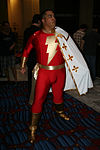
|
DC Comics meets Big in the superhero comedy where a Philadelphia kid gets the power to become a muscle man who can also fly and shoot lightning - that in the comics was originally known as Captain Marvel, but for obvious reasons it's not used (in fact, in the movie they never get to a consistent moniker...). Hilarious yet heartfelt, Shazam! was well-received by reviewers and audiences, and hopefully can make a lot of money until its biggest competitor arrives. | |
| 6 | Billie Eilish | 970,686 |  |
In spite of how dead musicians bring in lots of listens\purchases to their discography, our #1 only got second place in the Lana del Rey (though thankfully less soporific and depressing).
| |
| 7 | April Fools' Day | 938,641 | The day where elaborate pranks and practical jokes are pulled. And how I wish "my country's president is pushing for using this day and March 31st to celebrate a coup and all the damage it caused" was one of those. | ||
| 8 | WrestleMania 35 | 691,439 |  |
Given the amount of anticipation this wrestling event has gotten before it actually happened on April 7 (down to a Last Week Tonight segment that caused some ruckus ), it's the possible #1 for our next report.
| |
| 9 | Joker (2019 film) | 684,594 |  |
archnemesis is portrayed by Joaquin Phoenix (pictured) in an origin story which just had its first trailer released, and will hit theaters in October. Even if director Todd Phillips has mostly made comedies such as The Hangover and the main character is for all intents and means a clown, it will be another serious DC Comics movie, in contrast to our #5.
| |
| 10 | Us (2019 film) | 632,791 | Plenty of money and acclaim for a movie with the important lesson of avoiding people in red carrying scissors. |
April Show Us (April 7 to 13)
It's mostly the same thing as last week, including a highly-anticipated wrestling extravaganza (#1), a superhero movie (#3) and a rising female singer (#7), but at least the end of life (#2, #8) is matched by where all matter ends (#6), a recent arrest (#4) counters a past crime (#5), which for being the inspiration of a Netflix movie also gets the company of an HBO show (#9, #10).
| Rank | Article | Class | Views | Image | About |
|---|---|---|---|---|---|
| 1 | WrestleMania 35 | 2,078,000 |  |
For reasons I have never been able to fathom, people continue to be intrigued by so-called entertainment wrestling events like SmackDown Women's Championship and sealing her victory.
| |
| 2 | Nipsey Hussle | 1,973,249 | 
|
Hiphop singer-songwriter Ermias Joseph Asghedom aka Nipsey Hussle was shot down last week at his local store, becoming the 43rd professional from the genre to be murdered. He is survived by #8. | |
| 3 | Shazam! (film) | 1,372,523 | 
|
The latest DC superhero film, starring Batman v Superman . It also did better than expected at the box office, grossing $53.5 million USD in the US on its opening weekend there.
| |
| 4 | Julian Assange | 1,325,968 |  |
After years hiding in the Ecuadorian embassy in London, lest he be extradicted to Sweden for rape charges, the founder of WikiLeaks was forcibly removed by the police so he'd be extradicted to the United States instead for espionage and computer intrusion charges. | |
| 5 | Bonnie and Clyde | 1,163,368 |  |
Already the subject of a classic movie, the famous outlaw couple now serve as the unseen antagonists of Netflix's hit film The Highwaymen. | |
| 6 | Black hole | 1,157,950 |  |
In a great feat for science - and women scientists in particular - the Event Horizon Telescope, using algorithms made by Katie Bouman, managed to gaze into the supermassive, supermassive black hole at the center of Messier 87 and take the picture to the left. | |
| 7 | Billie Eilish | 815,714 |  |
Along with a #1 album and various hit songs, this 17 year old singer-songwriter also performed at the Coachella Valley Music and Arts Festival, where Eilish both fulfilled a dream of meeting Justin Bieber and managed to forget her own lyrics.
| |
| 8 | Lauren London | 804,610 |  |
London is #2's partner, and had a son, Kross, with him. | |
| 9 | Game of Thrones | 773,777 | After a year and a half off the air, it is now time for the last season of the hit TV series filled with sex, blood, political intrigue, dragons, ice zombies, and terrible things happening to whoever has the audience sympathy. Expect Westeros to not leave the Report for the next six weeks, if not more.
| ||
| 10 | Game of Thrones (season 8)
|
751,539 |
C'étaient les dragons, à mon avis (April 14 to 20, 2019)
The world, and by proxy the perusers of Wikipedia, was struck by three stories this week - the incendiary damage sustained by the celebrated, hunchback-less Parisian cathedral of Notre-Dame, the venerable victory of
Without further ado, for the week of April 14 to 20, 2019, the 25 most popular articles on Wikipedia, as determined from the WP:5000 report were:
| Rank | Article | Class | Views | Image | About |
|---|---|---|---|---|---|
| 1 | Notre-Dame de Paris | 6,716,199 |  |
One of the more recognisable Parisian landmarks, alongside L'Arc de Triomphe, was irrevocably changed by a monumental blaze this week, which captivated and shocked the world. Renovation works were underway on the famed cathedral, and these reportedly exacerbated the risk of, and ultimately caused, the fire, which consumed the spire of the church, alongside much of the roof. Firefighters nobly attempted to contain the inferno, but given the impossibility of audacious plans involving airdropping water, were unable to prevent much of the damage sustained to the historic 12th century site, whose striking Gothic architecture may never be the same again. Thankfully, the tragic damage sparked a wave of generosity that culminated in charitable donations amounting to €900 million to finance the subsequent renovations and repairs, which may take up to two decades to be completed.
| |
| 2 | Tiger Woods | 3,127,942 |  |
The greatest sporting comeback outside of Augusta National last weekend, with the long-awaited return of the most successful golfer of the 21st century to the most major of stages. For the first time in eleven years, the world of professional golf heard the roar of the ferocious tiger, mercilessly efficient in pursuing his prey through Amen Corner and beyond, and ultimately donning the green jacket for the fifth time in his storied career, a feat which would have been considered an impossibility by the vast majority of golf aficionados a mere year ago.
| |
| 3 | Game of Thrones (season 8)
|
2,528,460 |  |
The best show currently on television has returned for its eighth and final season, and the world is on tenterhooks to see who shall sit upon the HBO series have seen in recent weeks. Given that Game of Thrones is renowned for its shocking, horrific, traumatising deaths, you should all be prepared for the only logical way in which the series can conclude - with the commencement of the reign of Hot Pie, first of his name.
| |
| 4 | Game of Thrones | 1,516,505 | |||
| 5 | Billie Eilish | 911,973 |  |
I honestly have very minimal idea who this is, beyond the fact that she is a singer, and after listening to some of her music in preparation for this piece, have minimal inclination to change this. My exposure to Eilish involves hearing various jokes about how her new single resembles the greatest song ever written, but, to reiterate, I lack the insight to either verify or refute this claim. Only time will tell if the emergent seventeen year-old is a new force in the music industry, or a flavour of the month, and I am hesitant to speculate either way. To do so would surely make me the bad guy. | |
| 6 | List of Game of Thrones episodes | 900,781 |  |
Duh duh duh na nuh nuh da da duh duh duh na nuh nuh ... | |
| 7 | Notre-Dame de Paris fire
|
863,794 |  |
The fire which occurred at the gorgeous Gothic cathedral in Île-de-France caused extraordinary destruction, but more positively united the people of France and beyond in charitable unity, spearheaded by nine-figure donations from famous French billionaires like the Arnault, Bettencourt, and Pinault families, which will be used to finance the necessary reconstruction and restore the cathedral to its world-famous, awe-inspiring glory. | |
| 8 | Pete Buttigieg | 760,812 |  |
The mayor of South Bend, Indiana, Pete Buttigieg is the latest of a long string of donkeys to throw their hats into the ring to contest the 2020 election against the Donald. Buttigieg lacks the credentials of some of his forthcoming opponents, having never served in either chamber of Congress, but the Harvard graduate has garnered a considerable amount of attention from the media after embracing his husband on stage at his candidacy announcement, propelling him to unprecedented heights in primary polls. | |
| 9 | Bonnie and Clyde | 728,453 |  |
The most notorious amourous duo of American crime are currently capturing the eyes of binge-streaming Wikipedians courtesy of the content overlords over at Netflix, and their latest viral original film, The Highwaymen, which stars the Prince of Thieves and Haymitch Abernathy as FBI agents in pursuit of the murderous thieves, who have somehow been romanticised in spite of their status as serial killers. The couple have maintained a constant presence in the pantheon of criminals for nearly a century, aided by zeitgeist-capturing appearances such as those of Dunaway and Beatty, and thus it is of little surprise that they continue to engage the curiosity of Wikipedians. | |
| 10 | Avengers: Endgame | 726,105 |  |
I lack the courage to mutter a mere word, or even a Google search, until midnight on Thursday, so sorry. You know what this is, and should ready yourself for it to rest atop future iterations of the report - this article's page views are about to tend to infinity .
|
Exclusions
- These lists exclude the Wikipedia main page, non-article pages (such as redlinks), and anomalous entries (such as DDoS attacks or likely automated views). Since mobile view data became available to the Report in October 2014, we exclude articles that have almost no mobile views (5–6% or less) or almost all mobile views (94–95% or more) because they are very likely to be automated views based on our experience and research of the issue. Please feel free to discuss any removal on the Top 25 Report talk page if you wish.
A new special page, and other news
New Special Page
Starting on April 11th, a new special page was introduced on meta wiki, a URL shortener. Though it can only be accessed on meta (at m:Special:UrlShortener), it can make links to any wikimedia project. For example, w.wiki/U3 links to User:DannyS712, while w.wiki/UE links to The Signpost.
Once a shortened URL has been created, {{Short URL}} can be used to create a link with only the redirect's unique URL ending. Thus, {{short URL|UE|''The Signpost''}} creates a link to The Signpost.
Read more at Wikipedia:Village pump (technical)/Archive 173#URL shortener for the Wikimedia projects will be available on April 11th and at Meta:Wikimedia URL Shortener.
In brief
New user scripts to customise your Wikipedia experience
- Notifier[1] (source) – quickly notify other talk pages of a discussion on the current page
- View Source[2] (source) – Adds a "view source" option to editable pages
- Restorer[3] (source) – adds links beside every revision in page history to restore that revision.
Bot tasks
Recently approved tasks
- ADMINBOT
- RetractionBot (BRFA · contribs · actions log · block log · flag log · user rights)
- FastilyBot (BRFA · contribs · actions log · block log · flag log · user rights) (Task: 14)
- KadaneBot (BRFA · contribs · actions log · block log · flag log · user rights) (Task: 3)
- RF1 Bot (BRFA · contribs · actions log · block log · flag log · user rights) (Task: 2)
- GreenC bot (BRFA · contribs · actions log · block log · flag log · user rights) (Tasks: 13, 14)
- PkbwcgsBot (BRFA · contribs · actions log · block log · flag log · user rights) (Tasks: 7, 12, 23)
- DannyS712 bot (BRFA · contribs · actions log · block log · flag log · user rights) (Tasks: 12, 15, 16, 17, 23, 25, 27, 28, 29, 30, 31)
Current requests for approval
- Open
- DiBabelYurikBot (BRFA · contribs · actions log · block log · flag log · user rights)
- SportsStatsBot (BRFA · contribs · actions log · block log · flag log · user rights) (Task: 2)
- JATMBot (BRFA · contribs · actions log · block log · flag log · user rights)
- Xinbenlv bot (BRFA · contribs · actions log · block log · flag log · user rights)
- In trial/extended trial
- GreenC bot (BRFA · contribs · actions log · block log · flag log · user rights) (Task: 11)
- ArbClerkBot (BRFA · contribs · actions log · block log · flag log · user rights)
- WikiCleanerBot (BRFA · contribs · actions log · block log · flag log · user rights) (Task: 2)
- HostBot (BRFA · contribs · actions log · block log · flag log · user rights) (Task: 9)
- PkbwcgsBot (BRFA · contribs · actions log · block log · flag log · user rights) (Task: 5)
- ) (Task: 13)
- Trial complete
- DannyS712 bot (BRFA · contribs · actions log · block log · flag log · user rights) (Tasks: 33 & 34)
- Qbugbot (BRFA · contribs · actions log · block log · flag log · user rights) (Task: 3)
- WikiCleanerBot (BRFA · contribs · actions log · block log · flag log · user rights) (Task: 3)
Latest tech news
Latest tech news from the Wikimedia technical community: 2019 #14, #15, #16, #17, & #18. Please tell other users about these changes. Not all changes will affect you. Translations are available on Meta.
- New and upcoming features
- When you add an edit summary the VisualEditor will search your recent edit summaries in case you want to re-use one. This works in both the visual and wikitext modes on desktop. It also works on the mobile site. [1]
- You will be able to preview references. This means that when you hover over the link you will get a popup that shows you a preview of the reference. It will work much like page previews. This is so you don't have to go to the bottom of the page to see a reference. This will now be available as a beta feature on German and Arabic Wikipedia. [2][3]
- The advanced search function URL now shows which namespaces you search in. The namespace field is collapsed by default on the search page. You can also add new fields to the search interface through a hook. [4][5][6]
- The wikis now look slightly different in the mobile web version. [7]
- Wikipedia articles will have the
sameAsmeta property. It adds structured data. This makes it easier for search engines to find Wikipedia articles. It also makes it easier to reuse content. There will an A/B test. [8][9] - You will see when you last refreshed the recent changes page. This is so you can see how recent the changes are. [10]
- When you write a comment in Structured Discussions but have not posted it yet your web browser will save it in
local storageinstead ofsession storage. This means you do not lose them even if you close your web browser. Structured Discussions used to be called Flow. [11] - You will be able to turn off milestone notifications. Milestone notifications congratulate you when you have made certain numbers of edits. [12]
 Wikimedia wikis will soon use a token when you log out. This changes how the API works. Some tools might need to be updated. [13]
Wikimedia wikis will soon use a token when you log out. This changes how the API works. Some tools might need to be updated. [13]
- Old features
- Notifications tell you about things that happen on the wiki. You can turn on notifications about new links to pages you created. For performance reasons you can no longer get e-mails about this. [14]
 The
The {{REVISIONID}}magic word will no longer work. This is for performance reasons. When you preview a page it will return""(empty string). When you read a page it will return"-"(dash). For now this will only affect content namespaces. [15]
- Problems
- A map update caused some problems on 29 March and 30 March. It was rolled back. [16]
- Pages on some Wikivoyages had problems with the top headline. This has been fixed. [17]
- Tech News was late last week because of a MassMessage bug. Other newsletters had the same problem. [18]
- Wikidata
- Wikidata will get a new constraint status called
suggestion. This will change how theWikibaseQualityConstraintsconstraint checking API works. [19][20]  The Wikidata JSON output will change. Empty containers will be serialised as empty objects. This is a breaking change that will affect tools that use JSON outputs and APIs. It will happen on 30 April. You can read more and see how to test your code.
The Wikidata JSON output will change. Empty containers will be serialised as empty objects. This is a breaking change that will affect tools that use JSON outputs and APIs. It will happen on 30 April. You can read more and see how to test your code. The Wikidata
The Wikidata wb_termstable will be dropped. This will affect some Wikidata tools. They need to be updated. The table has become too big which is causing problems. This will happen on 29 May. You can read more. You can ask for help if you need it.
- Other updates
- All wikis now have the TemplateWizard for the wikitext editor.
- You can test the
depictsproperty for structured data on Commons. - More wikis are now testing visual editor section editing for mobile users. You can read more.
- Admins on French and Polish Wikipedia can block someone from editing a page or a namespace. If your wiki wants to get these blocks before they are available to all wikis, you can tell the developers. [21][22]
- The Wikipedia app for Android now invites users to add Wikidata descriptions to Wikidata objects that have Wikipedia articles but no Wikidata descriptions. It will only invite users who have added a number of Wikidata descriptions in the app without being reverted. This is to avoid spam and bad edits. [23][24]
Meetings

 You can join the technical advice meeting on IRC. During the meeting, volunteer developers can ask for advice. The meeting takes place every Wednesday from 4:00–5:00 p.m. UTC. See how to join here.
You can join the technical advice meeting on IRC. During the meeting, volunteer developers can ask for advice. The meeting takes place every Wednesday from 4:00–5:00 p.m. UTC. See how to join here.
Installation code
- ^ Copy the following code, edit your user JavaScript, then paste:
{{subst:lusc|1=User:Newslinger/Notifier.js}} - ^ Copy the following code, edit your user JavaScript, then paste:
{{subst:lusc|1=User:Suffusion of Yellow/viewsource.js}} - ^ Copy the following code, edit your user JavaScript, then paste:
{{subst:lusc|1=User:BrandonXLF/Restorer.js}}
Notre-Dame de Paris burns

at coordinates 48°51′11″N 2°20′59″E / 48.853°N 2.3498°E
A devastating
Notre-Dame is one of the most photographed buildings in the world. Many photos and several videos of the fire were uploaded to Wikimedia Commons.
We'll let the images tell the story.
Before, during, and after
-
South facade 28 April 2009
-
South facade 19:17, 15 April 2019
-
South facade 16 April 2019
Video
During the fire
-
View from the east
19:20 -
From the south
19:41 -
Fire on the roof, from the south
19:45 -
West facade
19:50 -
From the south
19:51 -
From the east
20:06 -
From the east
21:00
Can machine learning uncover Wikipedia’s missing “citation needed” tags?
This article originally appeared in the Wikimedia Foundation blog on April 3, 2019.
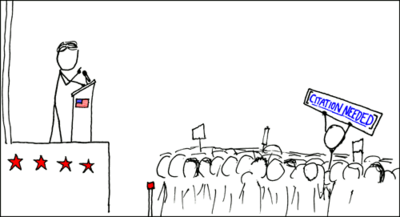
We are using machine learning to predict whether—and why—any given sentence on Wikipedia may need a citation in order to help editors identify areas of content violating the verifiability policy.
One of the key mechanisms that allows Wikipedia to maintain its high quality is the use of inline
However, deciding which sentences need citations may not be a trivial task. On the one hand, editors are urged to avoid adding citations for information that is obvious or common knowledge—like the fact that the sky is blue. On the other hand, sometimes the sky doesn’t actually appear blue—so perhaps we need a citation for that after all?
Scale up this problem to the size of an entire encyclopedia, and it may become intractable. Wikipedia editors’ time is limited and their expertise is valuable—which kinds of facts, articles, and topics should they focus their citation efforts on? Also, recent estimates show that a substantial proportion of articles have only a few references, and that one out of four articles in English Wikipedia does not have any references at all. This suggests that while around 350,000 articles contain one or more citation needed flags, we are probably missing many more.
We recently designed a framework to help editors identify and prioritize which sentences need citations in Wikipedia. Through a large study that we conducted with editors from English, Italian and French Wikipedia, we first identified a set of common reasons why individual sentences in Wikipedia articles require citations. We then used the results of this study to train a machine learning model classifier that can predict whether or not any given sentence needs a citation —and why—on the English Wikipedia. It will be deployed in the next 3 months to other language editions.
By improving the identification of where Wikipedia gets its information from, we can support the development of systems to help volunteer-driven verification and fact-checking, potentially increasing Wikipedia’s long-term reliability and making it more robust against biases, information quality gaps and coordinated disinformation campaigns
Why do we cite?
To teach machines how to recognize unverified statements, we first needed to systematically classify the reasons why sentences need citations.
We started by examining policies and guidelines related to verifiability in the English, French, and Italian Wikipedias and attempted to characterize the criteria for adding (or not adding) a citation described in those policies. To verify and enrich this set of best practices, we asked 36 Wikipedia editors from all three language communities to participate in a pilot experiment. Using WikiLabels, we collected editors’ feedback on sentences from Wikipedia articles: editors were asked to decide whether a sentence needed a citation and to specify a reason for their choices in a free-text form.
Our methods and our final set of reasons for adding or not adding a citation can be found on our project page.


Teaching a machine to discover citation gaps.
Next, we trained a machine learning model to discover sentences needing citations, and characterize them with a matching reason.
We first trained a model to learn from the wisdom of the whole editor community how to identify sentences that need to be cited. We created a dataset of English Wikipedia’s “featured” articles, the encyclopedia’s designation for articles that are of the highest quality—and also the most well-sourced with citations. Sentences from featured articles that contain an inline citation are considered as positives, and sentences without an inline citation are considered as negatives. With this data, we trained a Recurrent Neural Network that can predict whether the sentence is positive (should have a citation), or negative (should not have a citation) based on the sequence of words in the sentence. The resulting model can correctly classify sentences in need of citation with an accuracy of up to 90%.
Explaining algorithmic predictions
But why is the model up to 90% accurate? What is the algorithm looking at when deciding whether a sentence needs a citation?
To help interpret these results, we took a sample of sentences needing citations for different reasons, and highlighted words the model considered the most when it classified the sentences. In the case of “opinion” statements, for example, the model assigned the highest weight to the word “claimed”. In the “statistics” citation reason, the most important words to the model are verbs that are often used in reporting numbers. In the case of scientific citation reasons, the model pays more attention to domain-specific words like “quantum”.

Predicting why a sentence needs a citation
Similar to the “reason” field of the [citation needed] tag, we want our model to also provide full explanations of citation reasons. Therefore we created a model that can classify statements needing citations with a reason. We first designed a crowdsourcing experiment using Amazon Mechanical Turk to collect labels about citation reasons. We randomly sampled 4,000 sentences that contain citations from Featured articles, and asked crowdworkers to label them with one of the eight citation reason categories we identified in our previous study. We found that sentences more likely need citations when they are related to scientific or historical facts, or when they reflect direct/indirect quotations.

We modified the neural network designed in the previous study, so that it can classify an unsourced sentence into one of the 8 citation reason categories. We retrained this network using the crowdsourced labeled data, and found that it provides reasonable accuracy (precision at 0.62) in predicting citation reasons, especially for classes with a substantial amount of training data.
Next steps: predicting “citation need” across languages and topics
The next phase of this project will involve modifying our models so that they can be trained for any language available in Wikipedia. We will use these multilingual models to quantify the proportion of unverified content across Wikipedia editions, and map citation coverage across different article topics, in order to help editors identify areas where adding high quality citations is particularly important.
We plan to make the source code of these new models available soon. In the meantime, you can check out the research paper, recently accepted at The Web Conference 2019, its supplementary material with detailed analysis of the citation policies, and all the data we used to train the models.
We would love to hear your feedback and comments, so please reach out to us on our project page to help us improve it.
The authors would like to thank the community members of the English, French, and Italian Wikipedias, along with workers from Amazon Mechanical Turk, for helping with data labeling and for their precious suggestions.
Miriam Redi is Research Scientist at the Wikimedia Foundation
Jonathan Morgan is Senior Design Researcher at the Wikimedia Foundation
Dario Taraborelli is a former Director of Research at the Wikimedia Foundation
Besnik Fetahu is a Post-doctoral Scientist at the L3S Lab Hannover
Female scholars underrepresented; whitepaper on Wikidata and libraries; undo patterns reveal editor hierarchy
A monthly overview of recent academic research about Wikipedia and other Wikimedia projects, also published as the Wikimedia Research Newsletter.
"Female scholars need to achieve more for equal public recognition"
- Reviewed by Thomas Niebler
The underrepresentation of women in science, not only STEM fields, is one of several problems the research community is dealing with. One aspect of this is the public recognition of female researchers, for example on Wikipedia. Women have to achieve more than men to be equally recognized in public. One specific example is given by
In their work,[1] Schellekens et al. supported this claim with a systematic analysis of the interdependencies of the existence of a researcher's Wikipedia article, their gender and their h-index, i.e. a measure of recognition of a researcher's scientific works. Using a logistic regression approach, they found that "regardless of [the] field of study, being male significantly increases the chance of being recognised and featured on Wikipedia". They state that a "male economist has to achieve an h-index of 11 for a similar probability of public recognition as a female economist with an h-index of 19", while "similar patterns are observed for Physics and Philosophy". As a conclusion, they discuss several factors that have to be worked on in order to increase public visibility of female researchers without them needing to win a Nobel prize first.[supp 1]
"ARL White Paper on Wikidata: Opportunities and Recommendations"
- Reviewed by Lane Rasberry

On 18 April, in a blog post the
Conferences and events
See the research events page on Meta-wiki for upcoming conferences and events, including submission deadlines, and the page of the monthly Wikimedia Research Showcase for videos and slides of past presentations.
Other recent publications
- Compiled by Tilman Bayer
Other recent publications that could not be covered in time for this issue include the items listed below. Contributions, whether reviewing or summarizing newly published research, are always welcome.
"Wikipedia access and contribution: Language choice in multilingual communities. A case study"
From the abstract:[3]
Seventy-seven first-year audiovisual communication students [at Pompeu Fabra University ] made contributions to Wikipedia as part of the assessed work in the first year course titled “Digital Culture.” Before and after writing Wikipedia articles, the students responded to two questionnaires that enquired about their language-related habits when using the site and about their language choice for contributing to it [with the vast majority stating Catalan and/or Spanish as their main languages]. ...
Students favor the English edition of Wikipedia when consulting it despite the fact that this is the language they assess themselves as being less proficient at in reading. More generally, our research shows that multilingual Wikipedia users move seamlessly from one language edition to another, thus refuting the cliché that relates minority languages with exclusively local and self-referential topics.
Undo patterns reveal "dominance order" among editors
From the abstract:[4]
... In this article we claim that dominance (respectively deference) is revealed by users
undoing(respectively redoing) edits of others. We propose methods to turn the history of Wikipedia pages into a dynamic multiplex network resulting from three types of interaction events: dyadic dominance, dyadic deference, and third-party assigned dominance ties. We analyze [...] a sample of page histories comprising 12,719 revisions by 7,657 unique users. On the dyad level we analyze whether two users tend to agree on a dominance order among them or whether dominated users tend to fight back. On the neighborhood level we analyze various degree effects including whether dominant users tend to dominate in the future and whether subordinate users tend to get dominated. On the triad level we analyze whether users have a preference for transitive closure over cyclic closure of dominance ties. These dynamic patterns shed light on the micro processes that can foster or impede the emergence of a global linear hierarchy."
See also our coverage of other publications by the same two authors.
"Wikipedia graph mining: dynamic structure of collective memory"
From the abstract:[5]
... we propose a distributed graph-based event extraction model, inspired by the Hebbian learning theory. [...] We focus on data-streams with underlying graph structure and perform several large-scale experiments on the Wikipedia visitor activity data [i.e. pageviews ]. We show that the presented model is scalable regarding time-series length and graph density, providing a distributed implementation of the proposed algorithm. We extract dynamical patterns of collective activity and demonstrate that they correspond to meaningful clusters of associated events, reflected in the Wikipedia articles. We also illustrate evolutionary dynamics of the graphs over time to highlight changing nature of visitors' interests.
See also blog post, code and dataset.
"(De)constructing public opinion. The collective creation of articles on political developments in the Wikipedia in Spanish"
From the English abstract:[6]
In this article we will see how the interaction of different users, both active and anonymous users who make vandalism, influence the reconstruction of public opinion from the cases of two articles in Wikipedia in Spanish.
"Suggesting Specific Segments as Link Targets in Wikipedia"
From the abstract:[7]
... there are a number of links in Wikipedia pointing to corresponding segments, because the whole article is too general and it is hard for readers to obtain the intention of the link. We propose a method to automatically predict whether a link target is a specific segment and provide which segment is most relevant. [...] Through evaluations on Wikipedia articles, our method performs better result than existing methods."
"DOI Links on Wikipedia. Analyses of English, Japanese, and Chinese Wikipedias"
From the abstract:[8]
In this paper, we analyzed
DOIs. JaLC DOIs were uniquely referenced in jawiki, and ISTIC DOIs tend to be referenced in zhwiki. In terms of DOI prefixes, Elsevier BV was the largest registrant in all languages. Nature Publishing Group and Wiley-Blackwell were also commonly referenced. [...] overlapping analysis showed that jawiki and zhwiki share the DOI links with enwiki at a similar high rate. The analysis of revision histories showed that the DOI links had been added to enwiki before they were included in jawiki and zhwiki — indicating that the majority of DOI links in jawiki and zhwiki were added by translating from enwiki."
References
- arXiv:1904.06310 [cs.DL].
- ^ "ARL White Paper on Wikidata: Opportunities and Recommendations". Association of Research Libraries. 2019-04-18.
- ISSN 2340-5236.
- ISBN 9783319509006.

- arXiv:1710.00398 [cs.IR].
- ISSN 2395-9576. ("(De)constructing public opinion. The collective creation of articles on political developments in the Wikipedia in Spanish", paper in Spanish, with English abstract)
- Supplementary references and notes:
Portals revisited
Portal related-discussion are still ongoing (see
The future of portals
Are portals to be open or closed?
There is an ongoing discussion about whether to eliminate the
Since this discussion started,
The discussion is currently taking place at the Village Pump under Ending the system of portals. It will run until "around May 8".[4]
Arguments for eliminating portals
Proponents of eliminating portals point out that many are rarely edited and often contain outdated information. Supporters of elimination also claim that since
Arguments for keeping portals
Supporters of keeping portals mention that some portals have been designed to require little maintenance, by randomly cycling through timely featured content (such as with the
Alternative proposals
Other users think that instead of deleting all portals, some or all of them should be marked as historical. Some believe that specific portals such as
Notes
- ^ Wikipedia:Village pump (proposals)/RfC: Ending the system of portals#Discussion: Ending the system of portals
- ^ According to this WikiProject Portals diff.
- ^ diff
- ^ Wikipedia:WikiProject Portals#Breaking news
- ^ There has been extended debate on this at Wikipedia:Village pump (proposals)/RfC: Ending the system of portals#Wikipedia is not a social network!
Jimbo and Larry walk into a bar ...
After last month's very serious discussion of humor in The Signpost, Wikipedians responded in a way that I did not expect. They started telling jokes. A few of them were actually pretty good. A search through some user pages and articles reveals that humor still lives on Wikipedia. I've hijacked some of it for this column. More will be found in the comments section. My appreciation to Levivich, Atsme, and EEng.
The Wikilawyer's Tale
Wikipedia's not for the meek
You need a de-stress technique
Sip tea with biscotti
Go fish – try karate
But edit war? Blocked for a week!
"Has the jury reached a verdict?" the judge asks.
"Yes, your honor," the jury foreperson replies. "The result of the discussion was jailify."
The wikilawyer jumps from his chair. "
"
"
"There is
"
"
"
"
The wikilawyer cries "
"
As the court officers move to handcuff the wikilawyer, the defendant bolts for the door, yelling, "
An inclusionist and a deletionist walk into a bar ...
- An inclusionist and a deletionist walk into a bar. The deletionist rips out the taps for any beers not nationally advertised and smashes all the bottles not on the top shelf. The inclusionist offers everyone a lukewarm Diet Dr Pepper. They both ask the bartender for a donation.
- In Russia, the Kremlin reads what you write on Wikipedia. In America, the Kremlin writes what you read on Wikipedia.
- Wikipedia: You have two cows. After discussion, your neighbors reach consensus that the cows belong to them, dismissing your objections per WP:1AM. You call the police. The police give the cows to whoever touched them last.
- A Wikipedian and a vandal are stranded on a desert island. On the first day, the Wikipedian builds a raft. That night the vandal destroys it. The second day, the Wikipedian tells the vandal that one or more of his contributions to the raft did not appear constructive, and rebuilds the raft. The vandal destroys it. The third day, the Wikipedian asks the vandal to please refrain from making unconstructive changes to the raft, and rebuilds it again. The vandal destroys it. The fourth day, the Wikipedian tells the vandal that if he destroys the raft again, he may not be allowed to help with the raft, and rebuilds it once more. The vandal destroys it. On the fifth day, an admin arrives with the navy, declares that nobody can build a raft until everyone on the island agrees on whether or not a raft should be built, and sails off.
- An editor applies to the Wikipedia Factory for a job. "We have two positions open," the administrator tells him. "The first opening involves building the machines, operating the machines, oiling the machines, cleaning the machines, repairing the machines, and also answering the phones and handling all administrative tasks necessary to run the factory. This position is unpaid, and workers are strictly prohibited from receiving any form of compensation whatsoever. Occasionally someone thanks you. Oh, and if you display any knowledge of our products we'll fire you."
- "What's the other opening?" the editor asks.
- "The other opening involves telling the workers what products the factory should make, how to make them, what they should look like, and what to call them. You'd be strictly prohibited from building the machines, running the machines, touching the machines, or doing any other work, but it's a paid position. Which job do you want?"- L

|
How To Avoid Pricks
|
When you land in a place that is prickly at best,
And feathers get ruffled – you've disturbed someone's nest; |
- Do you want to make money from Wikipedia? It's easy! Log out and go to work!
- Wikipedia: where anyone can edit and enjoy the benefits of income equality.- A

- What do you call a paid editor who won't accept cash? - A check user. -S
Help wanted
An editorial artist or cartoonist.
No captions, funny words in bubbles, or artistic talent required.
Benefits: standard Wikipedia vacations, insurance, and pay (up to twice your monthly average, provided it doesn't exceed our annual budget).
Apply at the Newsroom talk page or leave a sample in the comments section below. -S
Still waiting for Jimbo and Larry to walk into that bar? Sorry, that screenplay's still in development. But this is a wiki, so feel free to add your own version in the comments below, or to edit the versions of others.

The gaps in our knowledge of our gaps
What does 9% get you these days? Not much, you might think. That 9% is the proportion of editors who are women according to the 2018 Community Engagement Survey by the Wikimedia Foundation, and by all accounts that 9% gets us a distribution of biographies that is heavily slanted toward males.
But that 9% gets Wikipedia more than you think. It gets dozens of local projects across multiple languages working to address the issue. It got a piece in The New York Times and a peer-reviewed publication or two. It gets widespread attention and concerted community effort online and in real life, and it might just get a coherent strategy, because we have a pretty good idea what the problem is, why it needs to be solved, and we have many creative, dedicated people working on solutions. We've got edit-a-thons, outreach, and people from all backgrounds making friends through their computer screens and shaking hands in real life, coming together to address an issue that they all care about.
That's the value of knowing our gaps. Like an uncomfortable seat in a folding chair in the back of a 12-step program, the first step in fixing a problem is realizing that we have one. But we have some gaps in our gaps. In the same 2018 survey by the Foundation, they measured diversity among our contributors according to four points: gender, age, education and geography. That's not a very diverse diversity. I don't know about you, but there are many things about myself and the people I know, what we're interested in, what we read about, and what we write about that aren't captured by gender, age, education and geography.
How many of our articles on a wide range of subjects are being written without input from the wide range of groups they represent? We don't know the answer. We haven't even asked the question yet.
Some people claim to know Wikipedia's ethnic make up ("mostly white"), but the source of that information is not clear.[a] Even so, "mostly white" doesn't tell us much in a global context, as if a white guy from Georgia is the same as a white guy from the other Georgia. Admittedly, some geographic regions are more homogeneous than others, and asking about the distribution of African-American or First Nations editors may only make sense in one national context, but that doesn't mean that context isn't important. Some groups like the AfroCROWD are hard at work, reaching out, writing, and teaching others. But without any information on the groups they're trying to reach and represent, in many ways they're working in the dark.
Perhaps most worrying is that wherever we look for gaps we tend to find them. Beyond the gender gap there's a geography gap. Antarctica has as many articles written about it as almost any country in Africa, with African content including "only about 2.6% of the world’s geotagged Wikipedia articles despite having 14% of the world’s population and 20% of the world’s land".[c] There may be an urban/rural gap as well, at least if our editing population reflects our readership, with one study on Mexico finding that only a quarter of readers lived in rural areas.
There may also be a class gap, at least as far as the speculation of Katherine Maher, as she told Slate:
We don’t actually know much of the background of Wikipedia editors ... But it is true that we tend to assume that folks editing Wikipedia have what we think of as disposable time, and disposable time tends to correlate with higher socio-economic status.
An uneven distribution of editors across socio-economic status has its own implications, since social class is itself unevenly distributed among ethnic groups, urban and rural populations, and educational level. For other measures of diversity among editors, for example across religions or sexual orientation, few if any people have even pointed out that we really don't know, we aren't looking, and few people seem bothered by that.
I reached out to Jonathan Morgan, who unfortunately said that the person who coordinated the Community Engagement Insights Survey is no longer with the Foundation. So it's not clear that we may ever get a definite answer on the rationale behind studying only four-point-diversity. I also reached out to Rosie Stephenson-Goodknight, one of the founders of WikiProject Women in Red, and when asked about the importance of editor demographics to WiR, she drew a distinction among gaps, between those in our content, and those in our community:
[W]e are gender-neutral online editing community which does not focus on or care about the editor's gender. "Just write the articles." ... [T]he "content gender gap" is a "people" issue, not a "woman" issue ... Women in Red focuses on the content gender gap. It doesn't focus on or treat editors differently based on their gender. Everyone is welcome to participate in any way that is comfortable for them.
And I do agree that we don't want some situation where we partition articles with only in-group members writing articles on in-group topics. In fact, quite the opposite, and research has suggested that we get better articles precisely when we have editors with a diversity of perspectives working together on them. It is a people issue, and the more people we have on our issues the better off we are. But if we've got a pretty good idea that diversity is beneficial both to article content and community health, and on that point there seems to be a general agreement, then it seems that the natural next question is, "why aren't we measuring our progress on goals we all fairly well agree we are trying to achieve?"
Well, when I spoke to Isaac Johnson, who is facilitating the current study of reader demographics and looking toward planning a future study on editors, he expressed a sentiment that was echoed by both Rosie and Jonathan, of an apprehensiveness about the subject of group identification, of a feeling that these types of questions may be overly intrusive or alienating. As Issac put it, a concern that we will "end up excluding the very people we're trying to support with this work".
Perhaps I'm overly optimistic, in feeling that, in much of the world, most people are fairly secure in their identities, and that sharing who they are and what makes them unique in an anonymous survey wouldn't be overtly threatening. Maybe not. At the end of the day, it's difficult to tell because we haven't had a very robust discussion on the matter as a community. Hopefully this can be an opportunity to do so.
So I'm interested to hear what you think, and from what I'm told, at least a few people from the Foundation are as well. What demographics do you feel are important to your identity and your editing interests? Do you feel that there are any gaps you've personally experienced anecdotally in community and content that we might better address with a greater depth of understanding? Do you think that asking such questions would be overly intrusive, and if so, are there any ways to minimize this? Do you think the cost of intrusiveness is worth the potential benefit? Are you comfortable with some topics but not others? Does it make a difference that it's the Foundation gathering this data as opposed to someone else, and how do you feel about the fact that such data might influence decision making in grant funding or staff?
Is there something else here we're missing entirely? Let us know. Now's your chance, before we start the next survey, and we miss something we didn't know we weren't looking for.
Notes
- ^ Though it may have been inferred through a geographic over-representation of places such as Western Europe
- coverage of recent information. They noted that, out of all biographies that existed in 2015, 60% were for people who were still living at the time.
- ^ The same study determined that there were as many articles written about Western Europe as the entire rest of the world combined.
References
- ^ a b Gergaud, Olivier; Laouenan, Morgane; Wasmer, Etienne (2016). "A Brief History of Human Time: Exploring a database of 'notable people". Sciences Po Economics Discussion Papers, Sciences Po Departement of Economics. Retrieved 4 March 2019.
- ^ ISSN 0184-7783.
Katherine Maher marks 3 years as executive director

In June Katherine Maher will mark her third anniversary as executive director of the Wikimedia Foundation (WMF). Before becoming ED, Maher served as acting ED for three months, and WMF chief communications officer for two years. She had previously worked in communications with UNICEF, the National Democratic Institute, the World Bank, and Access Now.
This interview covers topics from the WMF's relationship with the editing community, to her accomplishments as ED, to diversity, harassment, WMF spending, airplanes, global advocacy, and The Badass Librarians of Timbuktu.
Sign Post: When you became ED what were your feelings then about the tasks ahead of you and in particular about working with the editor community which was then in an uproar? Is working with the community of editors one of your most challenging tasks?
Katherine Maher: Well, it was a really unexpected new role, and I was focused on trying to live up to the needs of the movement. I’d also just had back surgery for a spinal injury four weeks before Wikimania Esino Lario, so I was literally shaky on my feet! Which is to say, my feeling were a real jumble: I was humbled by the faith from the Board, I was excited for the chance to set the Foundation on a course that was more aligned with my understanding of our movement than in the past, and I was anxious about taking seriously the importance of the work ahead.
[In 2016] the relationship between the Foundation and the community had been strained for as long as I’d been around. There was little trust between the two groups, and the Foundation had made plenty of missteps along the way.
Truthfully, the relationship between the Foundation and the community had been strained for as long as I’d been around. There was little trust between the two groups, and the Foundation had made plenty of missteps along the way. But suddenly, Foundation staff, who are truly dedicated to the movement and mission, found themselves also in a difficult position, and more aligned with community than at any time in the past. There was a lot to take on at once, but also a lot of opportunity to try and reset and realign folks around the bigger free knowledge vision and our shared sense of values.
I felt as though there were three truly critical things to do: Improve the relationship between the Foundation and the community (both the individual editor community and also our community of affiliate groups), support Foundation staff coming out of a period of cultural upheaval, departures, and transitions, address the issues and give people a sense of stability, and rebuild critical capacities and institutional knowledge.
Bring people together around a direction for the organization and the movement overall -- a shared purpose and set of values. This became our work on movement strategy and creating a shared sense of direction across the movement.
To me, all three of these things were urgent and important.
You asked specifically about working with the editor community. I believed the tension between the editor community and the Wikimedia Foundation was untenable for community and staff alike. We’re all here for the vision, and being at odds with one another was going to hurt this thing that we’ve spent so many years building. I knew the Foundation needed to spend more time listening to communities, understanding people’s challenges and frustrations, and taking steps to respond. I didn’t expect that we would agree on everything - our movement is far too complex and diverse for that. But my goal was -- and continues to be -- to build trust and move forward. Today, I think we’re in a place where we're having more of a conversation, even if we don’t agree with each other. That’s a far better place!
So, in general, I feel like working with the editor community isn’t about being hard or easy -- it’s part of who we are, and how we make Wikimedia possible. When it’s hard, we at the Foundation have to ask ourselves why: is it because we’re off track? Because we need more conversations? Because we’ve skipped a step of trust? Again, sometimes we’re going to disagree, but let’s try to do that openly, with good faith. Because sometimes we’ll change our minds, sometimes the community sentiment will change, and sometimes we’ll find the right compromise. Such a big part of the Wikimedia ethos is that none of us necessarily knows more than the others of us, so there’s always an opportunity to learn together on how we can build and sustain this incredible thing on behalf of so many.
SP: What have been the major accomplishments of Wikipedia and the WMF in the last three years? What have been your own major accomplishments in the last three years?
KM: There are so many things that the movement has accomplished over the past three years. We’ve celebrated the 18th birthday of the English Wikipedia, and milestone birthdays for many other projects. We've seen our 300th language's Wikipedia emerge. Commons and Wikidata are up to 50 million images and items, respectively. Our community keeps growing globally, with more than 100 global affiliates, and women are increasingly represented in leadership roles. I like to point to the fact that on English Wikipedia, the percentage of articles about women has increased from 15 to nearly 18 percent. 15 to 18 percent may not sound like much, but that represents more than 86,000 new articles, about 72 new articles about women every single day, for about three and a half years -- and usually these articles are more meticulously sourced and higher quality than your average article. The ability to move the needle one article at a time is significant.
Wikipedia is more trusted today than ever.... I mean that more people see Wikipedia as a place that they can come to learn, to discuss, and find a sense of shared understanding -- that it’s precisely because of our non-commercial, community-driven model that they can trust us.
In the context of the broader world, I’m also excited that Wikipedia is more trusted today than ever. I don’t mean in the sense of mindless consumption of the articles -- after all, we’re a “citation needed” culture. Instead, I mean that more people see Wikipedia as a place that they can come to learn, to discuss, and find a sense of shared understanding -- that it’s precisely because of our non-commercial, community-driven model that they can trust us. At a time in which so much information is now perceived as contentious or polarized, Wikipedia’s importance to the public discourse is something that we can be proud of. The community and the Foundation share something of critical importance: we’re all working to improve Wikipedia. In that sense, the achievements of the Foundation are usually achievements shared with the community.
I'm proud of working with so many different community members on the strategic direction process. Through that process we’ve come together to identify our challenges, and collaborated to build something that is consistent with our movement, yet also pushes us to take on a broader, more inclusive understanding of what knowledge is and who gets to participate in knowledge. I'm also excited by the investments that we've been making in Wikimedia Commons and in Wikidata, as the Foundation is beginning to expand its perspective to their importance in the Wikimedia ecosystem. Finally, I think it’s important that we’ve been developing a voice that stands for our values in policy discussions and in broader public discourse.
Another way to think about this: when I came in as the head of communications several years ago, I used to open up the press clippings every day, and read with dismay articles about how Wikipedia was dying. Today, people are talking about how unique, important, and essential Wikipedia is. I think that is perhaps one of the most significant things that we've all done together.
SP: Both you and the WMF are unapologetically pro-diversity and more specifically, feminist. The number of women editors has not risen to 25% which was a goal set several years ago. How have you encouraged editors working with Women in Red and women’s issues in general over the last 3 years? What more do you plan to do?
KM: First of all, I take that as a compliment. Diversity is baked into our vision statement: the sum of all knowledge, every single human being. And feminism is a foundational part of diversity: if we’re talking about every single human being, we need to be talking about every single human being, including women and non-binary people. So, not only is this part of my values, it’s absolutely part of the Foundation’s mission. Our obligation to all the world's knowledge is about feminism and gender identity, along with other forms of diversity. Having said that, I share our critics’ dismay around our challenges in moving the needle on gender representation in our editing community and in our content. And when I speak about these issues, I'm rarely the first person to raise the alarm -- if anything, I’m often echoing back things that community leaders have been saying for some time.
we haven't reached the 25% overall participation rate for [women] contributors to our projects, but ... women represent 28% of affiliate leaders and 25% of program organizers, and the percentage of female representatives in affiliates’ boards grew from 20% to 28% between 2013 and 2017 . We also have much better gender representation when you look at chapter EDs, Board seats, affiliate committees and the like.
It’s true that we haven't reached the 25% overall participation rate for contributors to our projects, but we’re seeing positive movement in other parts of the movement. According to a 2016-2017 community survey, women represent 28% of affiliate leaders and 25% of program organizers, and the percentage of female representatives in affiliates’ boards grew from 20% to 28% between 2013 and 2017 . We also have much better gender representation when you look at chapter EDs, Board seats, affiliate committees and the like.
At the Foundation we’ve been focused on providing support, training, and mentoring for groups that focused on these issues. This runs the gamut, from researching and highlighting their work on our blog, such as Emily Temple-Wood and the “Keilana effect,” supporting peer-learning gatherings such as Wiki Women Camp and 2018’s Diversity Conference, or direct funding for intersectional efforts such as Art + Feminism. The core organizing team of Art+Feminism has received six grants over the past five years from the Foundation, totaling more than $440,000, as well as 32 grants to local organizers in many countries, including Egypt, Ghana, India, Peru, Botswana, New Zealand, Cameroon, Japan, and Italy. For many of these communities these are the first events organized around gender and have catalyzed both conversations and additional initiatives to increase gender diversity on the Wikimedia projects.
I also think it matters that the Wikimedia Foundation is a majority female-led organization. We have a woman board chair, a woman Executive Director, and more than 50% of people in management and leadership positions at the Wikimedia Foundation identify as women. I genuinely believe that this matters -- not just as a model, but in the decision-making of the organizations, affiliates, and structures of power that make up our movement. I’ll be curious how the impact of this leadership plays out in five years time.
All this said, we know we have a ways to go. There's work that we can do from our product standpoint, and in terms of supporting programs. The Foundation is currently doing a global survey* to understand women's perceptions around the value they get from Wikipedia and how we can encourage more women to participate. Our initial findings support what many in our movement have presumed anecdotally about how women engage with Wikipedia and why. Globally, more men have tried to edit Wikipedia than women have, and men find it more useful and trustworthy than women do. We’ll be sharing more information about these results and how our learnings will inform our future work to bring more women into our movement the coming months.
*The survey was run in a representative sample from the United States, Nigeria, Germany, Egypt, India, and Mexico.
SP: The New York Times recently wrote about harassment on Wikipedia targeting transgender and women editors. Have Wikipedia and WMF policies been effective in preventing harassment? Would the WMF or administrators offend the editing community as a whole by strict enforcement of anti-harassment rules, or by instituting new rules? The Times article stated that the WMF is considering a new private harassment reporting system. How is that going to work and when will it be rolled out?
KM: We know that harassment on Wikimedia is real. And it can be even more challenging when compared to other major web platforms, because harassment in Wikimedia is rarely as straightforward as that in the comments section of a social news feed. It’s just as problematic, but often harder to detect using technical tools. For example, when we started looking into harassment on the English Wikipedia, we learned that starting a conversation with the word “Please” was a strong indicator that a conversation would go off the rails. You wouldn't think that “Please,” an otherwise polite word, would lead to an unpleasant interaction -- and yet, on Wikipedia it often does. In my mind, this underscores the differences we face in tackling these issues versus other organizations. the relationship between the Foundation and the community had been strained for as long as I’d been around. There was little trust between the two groups, and the Foundation had made plenty of missteps along the way.
I don’t think most of the on-wiki policies we have today are conducive to creating safe and welcoming spaces. Far too frequently, people use our policies to walk the line while still engaging in harassing behavior.
You asked about Wikipedia’s policies around harassment. Truthfully, I don’t think most of the on-wiki policies we have today are conducive to creating safe and welcoming spaces. Far too frequently, people use our policies to walk the line while still engaging in harassing behavior. These are policies that we as a community have built together over time, and they enable behavior that drives away newbies, minorities, and other marginalized groups, making our mission unquestionably poorer for the absence of their voices. I believe that it’s time for the community and for the Foundation to engage in conversation about whether these policies are ultimately serving our objective of building the encyclopedia -- or whether they're preventing us from doing so.
In 2016 when I became Executive Director, the Board gave the Foundation a mandate to address harassment. Since then, we’ve become more assertive about enforcing actions on repeat offenders in our communities. In addition to removing the worst offenders, I hope people also feel secure in knowing that there are certain types of behavior that will no longer be tolerated. Similarly, the anti-harassment team at the Foundation has been researching and rolling out efforts around clear, enforceable policies and better tools to identify and address harassing behavior, but there’s still much to do.
One of the strategies we’re considering next is how do we improve the reporting process, both for the person flagging harmful behavior and for the community members who take action. We want to help people make more informative reports that get routed to the right person and that have a clear path to escalation if needed. We’re also looking at how we continue to improve transparency around these processes, to help both the community and the Foundation better understand the volume and severity of issues.
Yet, while that’s a good start we know there’s more work to be done. I often think about how great community members are at recognizing and addressing copyright violations on our projects -- imagine if our community felt that comfortable and empowered addressing harassment?
SP: Since 2017 when the WMF anti-discrimination policy was revised, there are no WMF policies against discrimination of protected classes of editors, only against discrimination against WMF employees and contractors. There would be some obvious difficulties in protecting anonymous editors against discrimination and it would be a huge job in any case, but is the WMF considering doing anything in this area?
KM: In 2017, we updated the policy to include new explicit protections and expanded definitions related to gender identity and expression, disability, citizenship, and ancestry. Historically the policy had been applied to only staff and contractors, and we wanted to make its application more explicit. Our intent wasn’t to limit how this was applied to people contributing to the projects, but to create opportunity for volunteers to explore spaces for women-identifying groups or cultural affinity groups on-wiki which might otherwise have been limited by the language of the previous policy. Of course, we still have other guidance on engagement that applies, including resources such as the code of conduct for technical spaces.
(As I was answering this question, I realized that I actually wrote the 2017 announcement about our changes to the anti-discrimination policy!)
SP: There’s a very old criticism of the WMF that predates your employment at WMF. It keeps on resurfacing from time to time however. How do you react to editors who say “The WMF has grown too fast; it raises and spends too much money. Much of that spending is just wasted on too many employees who don’t directly help editors.”?
KM: I know this one! And I’m sympathetic. We’re first and foremost a volunteer community and project, and there’s a natural tension with how resources are allocated between volunteer efforts and staff -- that’s true in so many organizations. Furthermore, how you see the Foundation’s size and budget is all a matter of perspective: after working for a 20-person non-profit, 350 people seems enormous to me. But compared to tens of thousands of people at other large web platforms, 350 often feels like a raft on the ocean.
every year, we see increased needs and demand -- whether it’s improved site performance and reliability, more support for non-Latin languages on-wiki or in Foundation communications and services, improved interfaces for mobile editing, improved tools against harassment, more support for diverse geographies, upgraded security and privacy practices, new tooling for the sister projects -- there’s no shortage of what we could be doing.
Every year at the Foundation, we go through a budgeting process in which we look at everything we’re doing, and figure out where we might be able to hire a few new people. And every year, we see increased needs and demand -- whether it’s improved site performance and reliability, more support for non-Latin languages on-wiki or in Foundation communications and services, improved interfaces for mobile editing, improved tools against harassment, more support for diverse geographies, upgraded security and privacy practices, new tooling for the sister projects -- there’s no shortage of what we could be doing. And we want to do it all with independence and integrity, in a way that reflects our values. We might have fewer staff and a smaller budget if we supported fewer languages, used private cloud hosting, or didn’t prioritize community health, but is that the Wikimedia we want to be?
Another way to think about this is that Wikimedia is the fifth most popular website on the planet, with about a billion people globally using our sites. Everyone else even remotely near this scale has tens of thousands of employees. And yet, even with those numbers, we’re so far from realizing our true vision: a future where every single person in the world can share in the sum of all knowledge. Often, when I talk to Foundation staff, they tell me we could be 3,500 people and still not cover the scope of the mission or the community needs. If we only reach around one billion people right now, we’re definitely going to need more capacity to realize that aspirational goal.
But that’s my perspective. And as I said at the beginning of this interview, we’re not always going to agree and that’s okay. That’s part of the nature of how Wikimedia works. I recognize how fortunate our movement is to have the amount of financial and community support that we do -- we should approach it with respect and humility.
SP: You spend a great amount of time on airplanes. Could you give an estimate of the number of flights or number of miles you’ve flown in the last year? Does this limit the amount of work you can get done in San Francisco? Who runs things while you are away? What are the benefits of the trips?
KM: Indeed -- it’s a lot of time on planes, too much, if you ask me! Last year, I think traveled about 200,000 miles, which is probably unhealthy for me and the world. But at the same time, I’ve found it absolutely invaluable to understanding the needs, challenges, and opportunities our communities face.

In any given month, I’m often attending community events and gatherings, including regional and thematic conferences and the Wikimedia Summit and Wikimania. Increasingly, I’m also on the road to meet with supporters of the movement -- not just donors, but partners and other allied groups. Sometimes I’m out speaking to critics: as pressure on “big tech” increases, I’m meeting journalists and policymakers to explain why our model and community is so different than many other parts of the web, and to encourage them to support policy objectives that recognize those differences.
I believe the biggest benefit of my trips is that I get to meet people in the places where they work, whatever that is. Wikimedia’s mission is most powerful when it comes to you: when you experience it in your context, your language, or as aligned with your personal mission. And meeting community members in their local environments is incomparable -- whether that’s at a library for an edit-a-thon, a university outreach program, or a gathering of a local affiliate. It is an opportunity to understand local challenges, put faces to names, hear about the impact of Wikimedia in a language or community, and truly understand the breadth and importance of our movement to so many people.
As for how it all works -- well, I’m answering these questions right now on a plane from 30,000 feet in the air! My travel doesn’t really limit my work, since the Foundation is increasingly remote and distributed across the world -- today only about a third of the Foundation’s 350 staff are in San Francisco. I strongly believe that this is the best way for our organization to reflect and serve our global community, which is itself remote and distributed, working collaboratively over distance and time. There's something very meaningful about working the way that the majority of our staff and contributors work. And fortunately, we have a great team and a new COO to make sure everything keeps moving in San Francisco -- and they know how to reach me, any time of day or night.
SP: Do you have time while flying to do much non-WMF reading? I was surprised that the Financial Times had two photos of your bookshelves, showing titles in Arabic, and authors like Daniel Kahneman and Philip Howard. Do these books contribute to your work at WMF or are they just to satisfy your personal search for knowledge? What are you reading now?
KM: Right now I’ve got three books in my carry-on bag:
I was always a voracious reader as a little kid -- I knew my hometown librarians by name, and they all knew me. My family would visit the library with a canvas bag and fill it up with books -- and then a week later, we’d go back and swap them all out for more. I’ve kept this up as an adult, though I own more titles now. In fact, the books on my bookshelf are just a subset of the total -- my parents really wish I’d come collect the rest from their house!
The reason you've noticed titles in Arabic, German, and other languages on my bookshelf in that photo is that I did study in all of those languages at one point, although unfortunately none really stuck. As for Kahneman and Howard -- I’ve been fortunate to have known Professor Howard for some time, and learned a lot from his work! But generally, my bookshelf reflects my eclectic set of interests, the places and work I’ve spent time, and my abiding interest in how technology intersects with the best and worst of the human condition.
SP: One of the proposed goals in the 3-5 year plan is to “Modernize our product experience.” This sounds like a move away from websites to mobile phone apps or perhaps other technologies. How do you expect this goal to be accomplished?
KM: You’re absolutely right -- but I’d restate it less about “moving away” from websites and more about embracing a future in which the website experience is only a part of our digital ecosystem. Already, it’s predicted that by 2020, 50% of all search experiences will be through digital voice assistants. And that’s not just on fancy phones and home devices -- voice assisted technologies have the potential to be transformative in lower literacy communities. Wikipedia should always be a place for collaboration and creation - open source, read/write, and true to our values. But I believe the vision for Wikipedia and Wikimedia goes well beyond the websites, to a world of connected free knowledge -- one in which people can explore free knowledge on different devices, interfaces, and experiences, where they can ask simple or complex questions, immerse themselves in rich images and media, and connect to other free knowledge repositories beyond our ecosystem (as already happens through so many of our GLAM partnerships). I believe this means reaching people in parts of the world we’re not currently serving well by making contribution, curation, and collaboration tools more equitable and easy to use. That means providing tools that work across many different devices with minimal technical needs. Mobile will absolutely be a part of the solution, although it won’t be limited to just new mobile technologies. We can do a lot more with our existing AI and automation tools to find content gaps in our projects, protect the integrity of content, and empower smaller projects within the community to adapt our software and platform to what’s most effective for them.
To make all of this happen, the Foundation and movement will need to invest in machine learning, structured data development, multimedia and interactive content capacity, server and network infrastructure, developer tooling and engineering productivity, and volunteer diversity. We need to understand how people are experiencing and consuming knowledge globally, and adapt while staying true to our values.
SP: One of the proposed priorities in the 3-5 year plan is global advocacy. Any political advocacy is always controversial among editors. Ideally the editing community should include people of almost all political views and movements. How can you engage with governments as different as those in China, Iran, Mexico and the U.S. while not offending large parts of the editing community?
KM: Wikimedia is not and should never be a partisan political organization. But global advocacy is not about politics -- or not only about politics! It is about understanding the broader legal, regulatory, and policy context in which our movement operates -- what are the laws and policies that support us in better serving our mission, and what are the policy trends that could threaten our projects, platforms, and people? I believe we have an obligation to advance a policy agenda that supports free knowledge, as well as protect the open web and fundamental rights that enable our community, projects, and mission to thrive.
I believe we have an obligation to advance a policy agenda that supports free knowledge, as well as protect the open web and fundamental rights that enable our community, projects, and mission to thrive.
To manage the diversity of perspectives from the many different governments around the world, our conversations need to be grounded in our values and our overarching mission. Most of the time, our conversations with governments focus on education and awareness, explaining how Wikipedia works, while remaining rooted in our values and commitments. But sometimes, this will also mean engaging with difficult actors -- especially those who attempt to censor or block the projects. But as ever, we’ll never compromise on censorship, transparency, or the Wikimedia open model. Again, our communities may not always agree on which policies, which issues, how vocal, or when. But I’ve always been impressed by our ability to find and build on consensus, including in conversations about the policies and laws where Wikimedia’s perspective should be heard.
SP: Another proposed priority in the 3-5 year plan is to increase worldwide readership, especially in Asia and Africa. The WMF has always been aggressively international and multi-cultural in its work, yet readership is still concentrated in Europe and North America. What can you do differently to help broaden Wikipedia’s readership?
KM: We know that by 2030, 80% of the world’s population will be in Asia and Africa -- continents that currently rank lowest on Wikimedia participation and readership. If we judge the success of our mission by every single human participating in all the world’s knowledge, that means we really have a ways to go.
This is why increasing worldwide readership is a top priority -- creating a stronger global presence of Wikipedia readers requires intention and work across the movement, from raising awareness of Wikipedia in parts of the world where it’s not widely known, to conducting user research on how people search and discover knowledge on and off the projects, to evolving the way people find and access knowledge on Wikipedia -- whether that be through new formats like video or structured data.
It means increasing language and translation support, and supporting our communities so that when people come to Wikipedia for the first, second, or third time, they’re finding articles that are relevant to them, in their own language. This includes working with new and existing partners, including in education and in GLAM, who better understand local context and knowledge traditions. It’s much more than readership -- after all, readers won’t use the projects if they don’t see their language, culture, experiences reflected in them. Readership is just the biggest, hardest thing to take on -- so we want to set that ambitious goal, in order to better understand the equally ambitious actions we undertake to be successful.
SP: Everybody, at least occasionally, thinks about their next job. What type of work would it take to get you to consider leaving the WMF? Or is being the ED of the WMF your ideal job? Perhaps someday you’ll want to retire or just do something less stressful. What do you think you’ll do then?
KM: Luckily I really, truly love my job. Even on the tiredest mornings, I’m able to get out of bed feeling fortunate to do something I love, with people I respect and admire, on behalf of a mission I truly believe in. It can be a lot at times, but that’s the nature of working for a movement that has such a spectacularly aspirational vision for the world.
In the past, I always knew it was time to move on when I started being more interested in something outside of my work than inside the role. What I’ve found is that the beauty of Wikimedia is that everything is in the work, whether it’s meeting new people and partners, learning about places, languages, or cultures that are new to me, understanding new technologies and systems that are going to impact our lives, or ways that knowledge is used as a tool of power or empowerment. There is never a typical day, and I love that about us.
This is an incredible organization where I have the opportunity to take on an ambitious mission, and do so in partnership with a community of people around the world. It reflects a global generosity of spirit in a time when we need more of it. And maybe, if and when I do take a break, I’ll go sit on a beach somewhere for a bit… and find a promising article in need of a good edit!
2019 Wikimedia Summit gathers movement affiliate representatives to discuss movement strategy
Wikimedia Summit 2019 was held 29–31 March in Berlin. The working conference brought together 210 participants from 69 countries to discuss the Wikimedia 2030 Movement Strategy Process, focusing on preparing draft recommendations in time for Wikimania 2019 in August. Participants included Wikimedia movement affiliate representatives from chapters, user groups, and thematic organizations; Movement Strategy working group members; members of the Wikimedia Foundation Board of Trustees; and Wikimedia Foundation staff.
Overview
This annual spring meeting was previously called the Wikimedia Conference. Beginning in 2017, the conference facilitated conversations on the 2030 strategy as part of its programming. Conference organizer Wikimedia Deutschland recognized a need to increase participant engagement and reduce programmatic breadth (see 3-year report and 2018 grant report). Accordingly, they reduced the conference size from about 300 to 200, narrowed its focus to movement strategy and governance, and renamed it "Wikimedia Summit" (2019 grant proposal).
Movement Strategy Process
The full conference report is available on meta at Wikimedia Summit 2019/Documentation. The main focus of the conference was to facilitate conversation on the Movement Strategy Process among affiliate members, working group members, and Wikimedia Foundation staff. For some working groups, the Wikimedia Summit was the first time they had all convened in person.
The working groups are organized through 9 thematic areas. Each working group is working towards a set of strategy recommendations.
The conference schedule included time for working groups to workshop alone and time for working groups to solicit feedback from affiliate representatives. The scoping documents reviewed by conference attendees are available here. Affiliate representatives were encouraged to sign up as a strategy liaison for their organized group (distinct from the paid community strategy liaison position) with the hopes of increasing affiliate engagement in the process.
Summit participants from outside the Wikimedia movement included Sunil Abraham, Executive Director of the Centre for Internet and Society, and Ryan Merkley, CEO of Creative Commons. They both addressed the conference to share their thoughts on the Movement Strategy Process during its closing meeting. Abraham, addressed attendees via video (on right). Some of the feedback he provided included trying to avoid "consultation fatigue" by spreading out the time frame for online community consultation (at 1:30 in the video) and "closing the loop" on the community consultation process, making sure that working groups and board members explain their reasoning for rejecting feedback (at 3:40).
Affiliate-Selected Board Seats
Two meetings were also held to inform affiliate representatives on the 2019 Affiliate-Selected Board Seats (ASBS) election. As detailed in a February 2019 Signpost article, a December 2018 Board of Trustees bylaws proposal included user groups in the ASBS election for the first time. In previous ASBS elections, only Wikimedia chapters were able to vote. Affiliate members reviewed a draft resolution on affiliate participation in the process (approximate version reviewed at the conference). In the meetings, affiliate members provided feedback to election facilitators on the resolution and the ASBS process as a whole. Affiliate members present at the meetings raised concerns on the draft resolution, including the compressed time frame of the election process and affiliate vote weighting. Notes from the meetings can be found on Etherpad.
The ASBS resolution was finalized on 5 April and approved by the Board of Trustees on 12 April (current version). The date of this article's publication marks the last day board candidates can be nominated (with the nomination period being 15 April–30 April). The full election timeline is available on the 2019 ASBS page.
What's ahead
The working groups will present modified recommendations at Wikimania 2019 in August. Continued community feedback is being solicited through venues such as the 2019 Community Conversations, open until the end of May. Final recommendations are to be implemented starting in December 2019.
Useful links
- Movement Strategy Process
- Movement strategy overview (presentation)
- 2019 Community Conversations, open until the end of May
- 2019 Affiliate-Selected Board Seats (ASBS) election
- Conference report
- Note
Airplaneman (talk · contribs), the author of this article, attended Wikimedia Summit 2019 as the affiliate representative for Wikimedians of Chicago User Group. Wikimedia Deutschland paid his travel and lodging costs for the conference.





